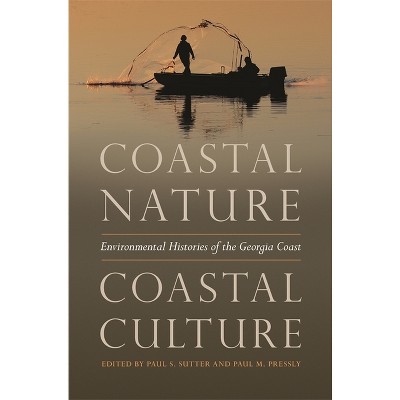Sponsored

Radioactive Dixie - (Environmental History and the American South) by Caroline Peyton
$29.95
Pre-order
Eligible for registries and wish lists
Sponsored
About this item
Highlights
- How and why did the South's history, culture, and politics shape the region's nuclear and energy industries?
- About the Author: CAROLINE ROSE PEYTON is a historian of the American South, whose research specializes in the intersection of environment, technology, and society.
- 284 Pages
- Nature, Environmental Conservation & Protection
- Series Name: Environmental History and the American South
Description
About the Book
"How and why did the South's history, culture, and politics shape the region's nuclear and energy industries? And how is that history linked to broader developments in the nuclear and energy industries-nationally and globally? Radioactive Dixie answers those questions as it traces the origins of the U.S. South's love affair with the atom. The South contains more nuclear reactors than any other region in the United States and much of the nation's radioactive waste. This book shows how the South's atomic footprint resulted from a decades-long effort by southern politicians, industry figures, universities, and government officials to transform the American South into a nuclear-oriented region. Waving the atomic talisman, the nuclear industry served as one pivotal part in a larger project of regional modernization-a process that began in the nineteenth century and lasted more than a century. From this perspective, bomb plants and nuclear reactors promised to expand the South's economy and to cast its identity as a center of modern industry, science, and engineering and as a producer of cheap, limitless energy. Radioactive Dixie is the first book to chronicle this regional story that had national implications. Southern history informed national siting decisions, regulatory oversight, and attitudes toward the various nuclear projects that proliferated in the post-World War II period"-- Provided by publisher.Book Synopsis
How and why did the South's history, culture, and politics shape the region's nuclear and energy industries? And how is that history linked to broader developments in the nuclear and energy industries--nationally and globally? Radioactive Dixie answers those questions as it traces the origins of the U.S. South's love affair with the atom.
The South contains more nuclear reactors than any other region in the United States and much of the nation's radioactive waste. This book shows how the South's atomic footprint resulted from a decades-long effort by Southern politicians, industry figures, universities, and government officials to transform the American South into a nuclear-oriented region. Waving the atomic talisman, the nuclear industry served as one pivotal part in a larger project of regional modernization--a process that began in the nineteenth century and lasted more than a century. From this perspective, bomb plants and nuclear reactors promised to expand the South's economy and to cast its identity as a center of modern industry, science, and engineering and as a producer of cheap, limitless energy. Radioactive Dixie is the first book to chronicle this regional story that had national implications. Southern history informed national siting decisions, regulatory oversight, and attitudes toward the various nuclear projects that proliferated in the post-World War II period.Review Quotes
Caroline Rose Peyton's provocative book explores the nuclear history of American South, and its waste facilities and power stations in Kentucky, Tennessee, South Carolina, and Mississippi. She deftly mixes the threads of political, social, and environmental history in showing how nuclear facilities promised jobs, a higher standard of living, and an end to poverty, but were bedeviled by huge construction delays, costly cancellations, and safety risks that fell unevenly on rural residents and provoked extensive local protest.--Paul Josephson "professor emeritus, Colby College, Waterville, Maine"
Peyton details an important--and missing--chapter in the history of America's experience with nuclear power by focusing on the region with the greatest concentration of nuclear power plants.--Robert Lifset "Donald Keith Jones Associate Professor of Honors, University of Oklahoma"
Radioactive Dixie is a dynamic, engaging, and very needed addition to the field of energy history that shows how communities and environments in the American south were integral to the strange story of mid century nuclear research and development.--Sarah Stanford-McIntyre "author of Natural Risk: An Environmental History of West Texas Oil and the Rise of Sunbelt Texas"
Caroline Peyton's cogent, deeply-researched narrative shows us how closely the political and economic ambitions of the postwar U.S. South were tied to the atom and its promises of growth, abundance, and prosperity.--Jacob Darwin Hamblin "author of The Wretched Atom: America's Global Gamble with Peaceful Nuclear Technology"
About the Author
CAROLINE ROSE PEYTON is a historian of the American South, whose research specializes in the intersection of environment, technology, and society. In 2017, she was awarded the American Society for Environmental History's Alice Hamilton Prize for the best article published outside Environmental History and the Southern Historical Association's Jack Temple Kirby Prize for "Kentucky's 'Atomic Graveyard' Maxey Flats and Environmental Inequity in Rural America," published in the Register of the Kentucky Historical Society.Dimensions (Overall): 9.0 Inches (H) x 6.0 Inches (W) x .64 Inches (D)
Weight: .85 Pounds
Suggested Age: 22 Years and Up
Number of Pages: 284
Genre: Nature
Sub-Genre: Environmental Conservation & Protection
Series Title: Environmental History and the American South
Publisher: University of Georgia Press
Format: Paperback
Author: Caroline Peyton
Language: English
Street Date: December 1, 2025
TCIN: 1007250547
UPC: 9780820373973
Item Number (DPCI): 247-01-5754
Origin: Made in the USA or Imported
If the item details aren’t accurate or complete, we want to know about it.
Shipping details
Estimated ship dimensions: 0.64 inches length x 6 inches width x 9 inches height
Estimated ship weight: 0.85 pounds
We regret that this item cannot be shipped to PO Boxes.
This item cannot be shipped to the following locations: American Samoa (see also separate entry under AS), Guam (see also separate entry under GU), Northern Mariana Islands, Puerto Rico (see also separate entry under PR), United States Minor Outlying Islands, Virgin Islands, U.S., APO/FPO
Return details
This item can be returned to any Target store or Target.com.
This item must be returned within 90 days of the date it was purchased in store, shipped, delivered by a Shipt shopper, or made ready for pickup.
See the return policy for complete information.
Trending Non-Fiction

$15.68
Buy 2, get 1 free select books
4.8 out of 5 stars with 181 ratings

$19.31
was $20.98 New lower price
Buy 2, get 1 free select books
4.1 out of 5 stars with 53 ratings

$19.58
MSRP $29.00
Buy 2, get 1 free select books
4.7 out of 5 stars with 11 ratings

$4.59
MSRP $7.99
Buy 2, get 1 free select books
4.8 out of 5 stars with 116 ratings

$6.20
MSRP $10.95
Buy 2, get 1 free select books
4.8 out of 5 stars with 32 ratings

$7.09
MSRP $9.99
Buy 2, get 1 free select books
4.9 out of 5 stars with 45 ratings





